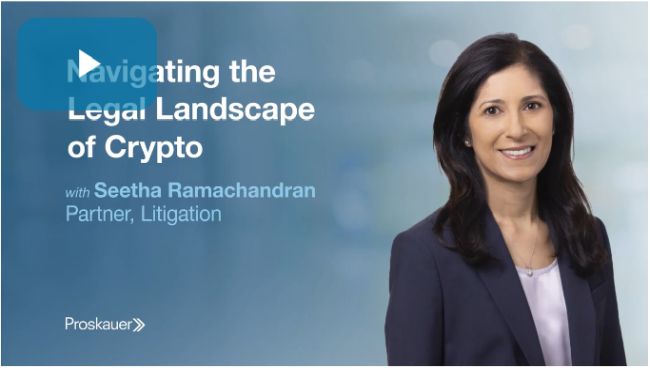As crypto products continue to evolve, we will see new disputes over what they are and how they should be treated. In this video, litigation partner Seetha Ramachandran discusses strategies for navigating this emerging legal landscape.
Transcript
Seetha Ramachandran: Lately crypto has been dominating the headlines. It seems like every day we're hearing about catastrophic losses in value, or a company collapsing or some other bad actor in the crypto world. But we're also hearing about the great promise that crypto has for growth and innovation. We need to understand what crypto is, how it impacts broader industries, and how to get in front of the disputes that are right around the corner. Just like the Internet in the 1990s, we don't know what part of the crypto ecosystem is going to end up having the biggest impact. In the area of disputes, which includes investigations and litigation, we're just at the beginning. Regulators are still trying to figure out how to get their arms around crypto. They see a landscape that's ripe for market manipulation, fraud, and other crimes. But they want to do it without impeding technology.
With any big technology shift, you're going to have high-stakes disputes when you take new technology that was created after legal rules were written, and then you try to apply those rules to that new technology. So how should it be treated as a legal matter? What laws should apply to it, and how should those laws apply? A perfect example is, "Is crypto a security?" The SEC has brought enforcement actions in this area. This question, "Is the crypto asset a security?" -- it's going to keep coming up over and over and over again in different iterations. And that same type of question, what is it, it's neither fish nor fowl. It's going to keep coming up in other contexts, including private contractual relationships. There are insurance policies that underwrite crypto. There are even going to be disputes about how you enforce a judgement against a crypto asset.
As crypto products keep evolving, we're going to see new disputes over what they are and how they should be treated. For example, sports teams are already creating NFTs, non-fungible tokens that can be traded like baseball cards. But now some gaming companies want to do something similar, which is create an NFT that's tradeable on the game.
Real estate is yet another example. Even in an industry where investors want to touch the asset and feel the asset and live in the asset, there has been a groundswell of interest in DAOs, which are decentralized autonomous organizations. This is where no traditional owner actually owns the property. This comes with significant compliance risks because you can't identify who the owner is. And the age-old real estate dispute, "you're blocking my view," gets a lot more complicated when you can't identify the party to sue in court.
Many of the questions I've gone through really have multi-billion-dollar implications. And this is how I prepare and I approach this area. The first is to manage regulatory risk. If a client is creating a new type of asset or I'm assessing a new product, I ask how would the government see this? Especially what if that product becomes very successful, becomes very visible, becomes on everybody's radar screen, how is the government going to react?
"As crypto products keep evolving, there will be new disputes over what they are and how they should be treated."
Second, I think about how old legal concepts are going to be applied to new products. I stay on top of current developments. That's really important, because if I see how the media is treating something, and if I see how regulators are reacting and how different government agencies are reacting, that gives me a clue into how the market is going to react and how old legal concepts might actually apply to a new product.
Third, I try to anticipate what could go wrong. When you're dealing with brand new technology and a brand-new type of asset, the disputes that come up are likely to be issues of first impression. Until there's a settled body of law on how digital assets are going to be classified, there will be uncertainty in how courts treat them whenever litigation arises.
In the area of crypto investigations and litigation, we're at the beginning. There are a lot of unknowns out there, but there's also a lot of opportunity, and there's a balance to be struck between the two.
Navigating The Legal Landscape Of Crypto With Seetha Ramachandran
The content of this article is intended to provide a general guide to the subject matter. Specialist advice should be sought about your specific circumstances.


